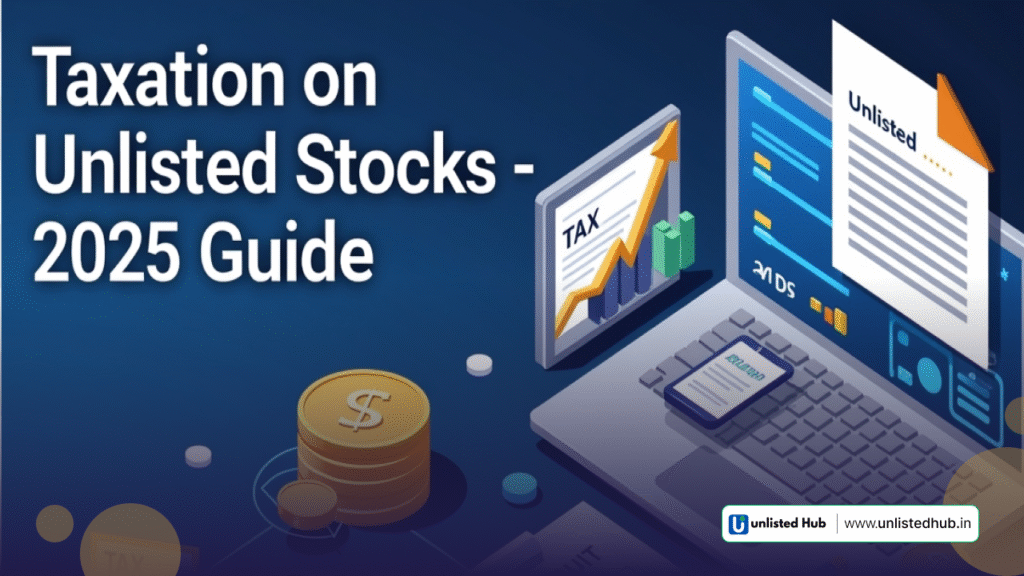Introduction:
In recent years, the private equity sector in India has experienced a noticeable surge in popularity, particularly among retail investors seeking early access to high-potential companies. Unlisted stock (also called unlisted shares) means shares of a company that are not traded on public stock exchanges like the NSE or the BSE and are usually bought or sold privately. These shares are typically traded privately, often through specialized brokers or platforms that focus on pre-IPO and private market investments.
As investors look beyond traditional stock exchanges for better returns, many are turning to private investments as a strategic way to diversify their portfolios. Companies like NSE, NSDL, Tata Technologies, and HDFC Securities have already attracted strong interest in the private market even before their public listings. While the growth potential of these investments is promising, understanding how tax rules apply has become just as important, especially in 2025, when regulations and reporting requirements are more structured.
Taxation on unlisted stock differs from that of listed shares in a few key ways. The applicable tax treatment depends on factors like the holding period, classification of gains, and available reliefs. Investors must stay updated on recent policy changes that influence how gains are reported and taxed. Additionally, unlisted holdings now require clearer disclosures in annual income tax filings as per revised guidelines.
For anyone planning to explore unlisted stock investments in 2025, having a clear understanding of taxation is crucial. It not only supports informed financial decisions but also ensures legal compliance and better exit planning.
A. What is unlisted stock
-
- An unlisted stock(also called unlisted shares) refers to a company’s share that isn’t traded on regular stock exchanges like NSE or BSE.
-
- These businesses raise funds through private investors, venture capitalists, or angel funding instead of the stock market.
-
- Many of these companies operate in niche markets, often with high growth potential. They might not be well known to the public, but their business models can be strong.
-
- Buying an unlisted stock allows investors to get in early — often before a company plans to go public. These shares are traded privately through brokers or special investment platforms.
-
- Since access is limited, unlisted stock often attracts investors looking for exclusive pre-IPO opportunities.
-
- However, such investments come with risks. There’s limited financial information, prices are negotiated directly, and liquidity is lower compared to listed shares.
-
- With the right research, an unlisted stock can bring good returns and diversify your portfolio beyond regular equity options.
-
- These investments are not regulated like public equities, so due diligence is crucial before making any purchase.
-
- Valuations may vary from broker to broker, so comparing offers from multiple sources can help you get a fair deal.
-
- It’s important to have a long-term outlook, as exits may not be immediate or straightforward.
-
- Investors should always check for proper documentation and ownership transfer processes to avoid future legal or financial complications.
B. Why is taxation important in unlisted stocks:
Understanding how tax rules apply to unlisted stocks is essential for making informed investment decisions. Here are the key reasons why taxation plays a critical role:
1. Impacts Net Returns:
Tax obligations can significantly reduce the actual profits from your investment in these privately held companies. Without considering tax liabilities, you might overestimate your earnings. Calculating the real post-tax return helps in comparing with other asset classes more accurately.
2. Different Rules from Listed Shares:
Taxation on unlisted stock is different from taxation on listed stock. While listed shares enjoy benefits like tax-free LTCG up to ₹1.25 lakh, unlisted shares are taxed differently, especially when it comes to long-term capital gains and indexation benefits.
3. Long-Term vs. Short-Term Capital Gains:
For such holdings, the period to qualify for long-term capital gains is 24 months (not 12 months like listed shares). This means if you sell your shares within two years, gains are taxed as per your income slab, which could be higher.
4. Indexation Benefits Matter:
If held for over two years, gains from unlisted stock are taxed at 12.5% without indexation, as per the latest rules. The indexation benefit, which previously allowed you to adjust the purchase price for inflation, has been removed. Note: The ₹1.25 lakh exemption applies only to listed shares and equity-oriented mutual funds, not to unlisted shares.
5. Affects Exit Strategy:
Your timing of exit should consider the tax impact. Exiting too early may result in higher short-term taxes, whereas a well-planned holding period can help you take advantage of long-term benefits and minimize taxes.
6. Mandatory Disclosure in ITR:
With stricter tax rules in place for FY 2025, investors must disclose their holdings in the income tax return (ITR), even if there’s no sale. Failing to do so could lead to penalties or scrutiny from tax authorities.
7. Compliance Builds Trust:
Being tax-compliant in your unlisted stock investments shows transparency and reduces risks during audits. This is especially helpful if you plan to transfer or liquidate holdings in the future.
8. Smart Tax Planning = Better Returns:
Proper knowledge of taxation on these investments allows investors to use smart strategies like timing exits, using losses for set-off, and planning gifting or succession efficiently.
C. Taxation on Unlisted Stocks
Understanding taxation on unlisted stocks is crucial for making smart investment decisions. Unlike publicly traded shares on exchanges like NSE or BSE, these investments have distinct tax rules. Here’s a clear breakdown for FY 2024-25:
1. Holding Period Defines Capital Gains:
-
- If you hold an unlisted stock for more than 24 months, it’s categorized as a long-term capital asset.
-
- Sales within 24 months result in short-term capital gains.
2. Short-Term Capital Gains (STCG) Rules:
-
- Profits from selling unlisted shares within two years are added to your total income.
-
- These gains are then taxed as per your applicable income tax slab, which can range from 5% to 30%.
3. Long-Term Capital Gains (LTCG) Rules:
-
- Gains on unlisted shares held for over two years are taxed at a flat 12.5% rate, as per the latest rules (effective July 23, 2024).
-
- Crucially, the benefit of indexation, which adjusted the purchase price for inflation, has been removed for these types of gains.
4. LTCG Exemption Threshold:
-
- Long-term capital gains from the sale of unlisted stock (and other capital assets) now benefit from an exemption threshold of ₹1.25 lakh for the financial year. The taxable portion is limited to any profit earned above this figure
5. Mandatory ITR Disclosure:
-
- It’s compulsory for investors to report their holdings in the income tax return (ITR), even if no sale occurred. Non-disclosure can lead to penalties or scrutiny from tax authorities.
6. TDS on Sale of Shares:
-
- While generally no TDS (Tax Deducted at Source) applies when resident individuals sell unlisted shares to other residents, specific scenarios do attract TDS. This includes sales to companies (like buybacks) or transactions involving Non-Resident Indians (NRIs), where a 12.5% TDS on LTCG may apply from July 23, 2024.
7. Importance of Tax Planning:
-
- Strategic holding periods, well-timed exits, and understanding the nuances of unlisted stock taxation can significantly help reduce your overall tax burden.
-
- It is always advisable to consult a qualified tax advisor for personalized guidance before making significant investment moves.
With knowledge of unlisted stock taxation, investors can plan effectively, ensuring their decisions are well-informed and their tax season runs without problems.
D. Capital Gains on Unlisted Stock: Tax Rules for 2025
Understanding how capital gains are taxed on unlisted stock is crucial for investors seeking higher returns outside the public markets. If you’re investing in companies that are not listed on stock exchanges like NSE or BSE, here’s a clear, point-wise guide to help you navigate the tax rules for FY 2024-25.
1. Short-Term vs. Long-Term Capital Gains
-
- Short-Term Capital Gains (STCG): If you sell these shares within 24 months of purchase, the profit is treated as short-term capital gain.
-
- Long-Term Capital Gains (LTCG): If you hold the shares for more than 24 months, the profit qualifies as long-term capital gain.
2. Tax Rates on Capital Gains
-
- STCG is added to your total income and taxed based on your income slab (5% to 30% plus surcharge and cess).
-
- LTCG is taxed at a flat 12.5% rate (effective from July 23, 2024), with no indexation benefit allowed.
3. No Exemption Threshold
-
- For this type of stock, there is no ₹1.25 lakh exemption on long-term capital gains. All profits are taxable from the very first rupee earned.
4. Calculating Capital Gains
-
- To calculate your gain: Capital Gain = Sale Price – (Purchase Price + Transfer Costs) Since indexation is no longer allowed after July 23, 2024, tax is applied directly on the full gain amount.
5. Mandatory ITR Disclosure
-
- You must report your holdings of these shares in your Income Tax Return (ITR), even if you haven’t sold them during the year. Not disclosing them can lead to penalties or tax notices.
6. TDS Provisions
-
- Normally, no TDS applies when selling to another resident individual. But in cases like share buybacks or sales to NRIs, TDS may be applicable. For NRIs, a 12.5% TDS is charged on long-term gains.
7. Tax Planning Tips
-
- Try to hold unlisted stock for more than 24 months to get the lower tax rate.
-
- Keep all records of your purchases, sales, and related costs for easy tax filing.
-
- Always consult a tax advisor to stay compliant and save money legally.
By following these capital gains rules for unlisted stock, you can plan smarter investments and avoid unnecessary tax issues
E. How to Report Unlisted Stocks in Your ITR (2025 Guidelines)
Proper reporting of your investments in unlisted stock is critical, especially with stricter compliance norms for FY 2024–25. The government has introduced detailed ITR guidelines to ensure better tracking and tax collection from private market participants.
1. Choose the Right ITR Form
-
- ITR-2 or ITR-3: Use ITR-2 or ITR-3 if you have invested in unlisted stock, depending on your other income sources. These forms require you to mention these shares separately under the “Assets and Liabilities” schedule.
-
- Income Threshold: The “Assets and Liabilities” schedule becomes mandatory if your total income exceeds ₹1 crore in the financial year. You are not allowed to use ITR-1 or ITR-4 if you own unlisted stocks.
2. Mention Acquisition and Sale Details
-
- Acquisition Details: Report the acquisition date and cost of purchase for each shareholding in your return.
-
- Sale Details: If you sold any, mention the sale date and sale value clearly. Also, indicate whether the sale occurred before or after July 23, 2024, since new capital gains tax rules apply from that date.
3. Use the Correct Section for Disclosure
-
- Capital Gains Schedule: Report profits from selling unlisted stock under the capital gains section of the ITR. This section is different from the one used for listed equities.
-
- Buyback Reporting: If the company has bought back your shares after October 1, 2024, report the proceeds as ‘Nil’ under capital gains and also declare them under ‘Income from Other Sources’.
4. Maintain Supporting Documents
-
- Essential Documents: Maintain broker agreements, payment receipts, demat account statements, and share certificates.
-
- Purpose: These documents help validate your entries in case of a tax audit and can be cross-verified with your Form 26AS and AIS.
5. Understand Foreign Holding Reporting
-
- Foreign Asset Disclosure: If you hold unlisted shares in a foreign company, declare them under the foreign asset schedule of your ITR.
-
- Penalty for Non-Disclosure: Failing to report can attract strict penalties under the Black Money Act.
6. Declare Even If No Gains Made
-
- Mandatory Disclosure: You must report your holdings of these shares, even if you haven’t sold them during the year. This is a compulsory rule under the updated ITR filing requirements for 2025.
7. Consult a Tax Professional if Needed
-
- Expert Guidance: Since tax laws related to private investments often change, it’s advisable to consult a tax professional. This ensures your reporting is accurate, compliant, and that your unlisted stock taxation is handled smoothly.
Correctly reporting unlisted stock in your ITR improves transparency and protects you from future legal or tax complications. Make sure your filings reflect all your private market investments with proper documentation and full compliance with the latest Indian tax rules.
F. Common Mistakes to Avoid in Taxation on Unlisted Stocks
Many investors—especially beginners—make errors in taxation on these stocks that can result in notices or tax mismatches. Recognizing these common mistakes can help you stay compliant and stress-free.
1. Not Disclosing Unlisted Stock Ownership
i) Mandatory Reporting:
- You must report each unlisted stock you hold in your income tax return, regardless of whether you have realized any gains.
ii) ITR Requirement:
- The ITR form now has a specific field for these holdings; non-disclosure can lead to penalties.
2. Using the Wrong Holding Period
i) Correct Rule:
- The holding period for long-term gains on unlisted stock is 24 months.
ii) Common Error:
Don’t confuse this with the 12-month rule for listed shares.
3. Ignoring Indexation and Cost Basis
i)No Indexation:
- Indexation benefit for LTCG on unlisted stock is removed from July 23, 2024.
ii) Always Verify:
-
- Check current rules before filing to avoid miscalculation.
4. Failing to Report Transfers Between Family Members
i) Gift and Inheritance:
- Transfers as gifts or inheritance must be declared in your ITR.
ii) Tax Treatment:
- Such transfers are treated differently for tax and must be shown accordingly.
5. Mixing Listed and Unlisted Gains in One Schedule
i) Separate Reporting
- Report capital gains from unlisted stock separately from listed shares.
ii) Avoid Red Flags:
- Mixing them can cause miscalculations and trigger scrutiny, as tax rates differ.
6. Not Keeping Backup of Purchase Agreements
i) Document Retention:
- Keep all proofs of investment, such as purchase agreements and demat statements.
ii) Audit Defense:
- Missing documents may result in tax rejection or higher liability.
7. Assuming Tax Deducted Automatically
i) Self-Assessment:
- In unlisted deals, tax is rarely deducted at source.
ii) Advance Tax:
- You are responsible for advance tax payments and including profits in your returns.
8. Missing New Reporting Requirements
– Buyback Reporting:
-
- If a buyback occurs after October 1, 2024, show the proceeds as zero in the capital gains section and also include the amount under ‘Income from Other Sources’.
Avoiding these mistakes will help ensure your experience with unlisted stock is rewarding, not risky. With the right documentation, careful reporting, and updated knowledge of taxation on these stocks, you can optimize your returns and avoid future legal issues. Always review the latest ITR instructions and consult a tax professional if you are unsure about any aspect of reporting or compliance.
Conclusion
Investing in unlisted stock can offer investors early access to high-growth companies, portfolio diversification, and pre-IPO opportunities. However, along with the potential for higher returns comes the need for careful tax planning and strict compliance. As the government strengthens its oversight on private investments, understanding the taxation on unlisted stocks is no longer optional—it’s essential.
In 2025, new rules have reshaped how capital gains are taxed, what needs to be reported in the Income Tax Return (ITR), and how transfers or buybacks are treated. Whether you’re a new investor or someone already holding such assets, accurate reporting, knowledge of capital gains rules, and awareness of holding period requirements will help you stay compliant and avoid penalties.
Remember, unlisted stock taxation involves more than just calculating profits. It includes documentation, correct ITR disclosures, and strategic planning. Avoiding common mistakes and staying updated with the latest tax changes will help you make better financial decisions and optimize post-tax returns.
As the private market continues to grow, investors who understand the tax landscape around unlisted stock will be best positioned to benefit—both legally and financially.






